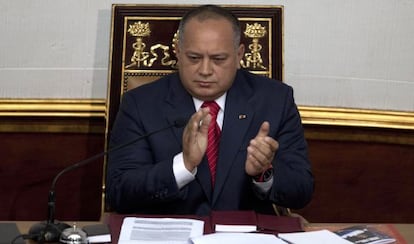US targets Venezuela’s powerful assembly speaker in drug inquiry
Several top government and military officials under investigation, says ‘Wall Street Journal’


The US government is investigating several high-ranking Venezuelan officials, including National Assembly speaker Diosdado Cabello, for alleged drug trafficking and money laundering activities, The Wall Street Journal (WSJ) reported on Monday.
An elite unit of Drug Enforcement Administration (DEA) investigators has been conducting the probes for more than two years, along with the US Attorney Offices in New York and Miami, the newspaper reported.
US prosecutors are building their case with testimonies from informants and ex-Venezuelan officials
They are allegedly gathering evidence from sworn statements and testimonies from convicted traffickers, former Venezuelan military officials who deserted their ranks, and other informants who were once close to Venezuelan authorities.
Besides Cabello, US investigators are also targeting Aragua state governor and former interior minister Tareck el Aissami, and Hugo Carvajal, a former director of Venezuela’s intelligence agencies, who in 2008 was linked in a US Treasury report to drug activities with the Revolutionary Armed Forces of Colombia (FARC) guerrilla group.
Also under investigation, according to the WSJ is National Guard director Néstor Reverol, Industry Minister David Cabello – the brother of the National Assembly speaker – and National Guard General Luis Motta Domínguez.
Nevertheless, Diosdado Cabello – the second-most-powerful official in Venezuela – is the US Justice Department’s principle target, the newspaper reported.
“There is extensive evidence to justify that he is one of the heads, if not the head of the cartel,” an unidentified Justice Department official was quoted as saying. “He is certainly a main target.”
One of Chávez’s bodyguards is reportedly cooperating with DEA officials after fleeing Venezuela
Earlier this year, ABC in Madrid and El Nuevo Herald of Miami identified Cabello as the head of the so-called Soles Cartel, which is allegedly responsible for large drug shipments moved with the help of the Venezuelan military.
One of the US government’s top witnesses is said to be Leamsy Salazar, a bodyguard to late President Hugo Chávez who defected to the United States at the beginning of the year. According to several news reports, he is cooperating with the DEA.
He reportedly told investigators that Diosdado Cabello personally supervised large cocaine shipments from Venezuela’s Paraguaná Peninsula.
Cabello has vehemently denied the charges.
Last week, a Venezuelan court prohibited 22 editors and representatives from the opposition dailies El Nacional and TalCual, as well as the La Patilla news website, from leaving the country.
The measure was taken after Cabello filed defamation lawsuits against these media outlets for reporting on the allegations linking him to the Soles Cartel.
In the report, The Wall Street Journal doesn’t identify the cartel by its name, but states that US authorities believe that several Venezuelan military and administration officials, who are under investigation, are “de facto leaders of a drug-trafficking organization that uses Venezuela as a platform to ship cocaine to the United States and Europe.”
Although the investigations are far along, the newspaper said that any indictments could remain under seal until arrests are made. Nevertheless, such arrests could be impossible unless the suspects left Venezuela.
Cabello was a key figure in helping Chávez return to power in 2002 after a brief coup. He became National Assembly speaker in January 2012.
Tu suscripción se está usando en otro dispositivo
¿Quieres añadir otro usuario a tu suscripción?
Si continúas leyendo en este dispositivo, no se podrá leer en el otro.
FlechaTu suscripción se está usando en otro dispositivo y solo puedes acceder a EL PAÍS desde un dispositivo a la vez.
Si quieres compartir tu cuenta, cambia tu suscripción a la modalidad Premium, así podrás añadir otro usuario. Cada uno accederá con su propia cuenta de email, lo que os permitirá personalizar vuestra experiencia en EL PAÍS.
¿Tienes una suscripción de empresa? Accede aquí para contratar más cuentas.
En el caso de no saber quién está usando tu cuenta, te recomendamos cambiar tu contraseña aquí.
Si decides continuar compartiendo tu cuenta, este mensaje se mostrará en tu dispositivo y en el de la otra persona que está usando tu cuenta de forma indefinida, afectando a tu experiencia de lectura. Puedes consultar aquí los términos y condiciones de la suscripción digital.








































